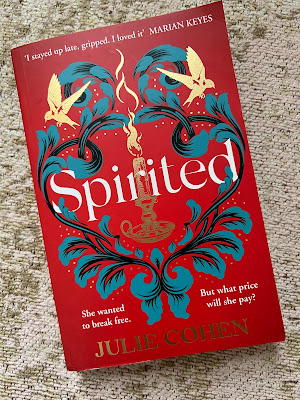Welcome (or welcome back!) to my blog and to my Neo-Victorian Voices series, in which I review novels set in the nineteenth century but written in the twenty-first. This time, I’ll be discussing Julie Cohen’s Spirited (2020), which (spoiler alert) I loved!
Julie Cohen and I were previously on a panel together, celebrating the Brontes during the 2020 pandemic lockdowns (catch a video recording of the event here). And I recently had the pleasure of listening to her keynote at the Historical Novel Society 2022 conference. However, this was my first time reading one of her novels.
Set in the 1850s, Spirited tells the story of Viola (an amateur photographer grieving the loss of her beloved father), her new husband, Jonah, who’s keeping secrets about his time in India, and Henriette, a “medium” who’s adept at conning the bereaved. Even this short description gives you a good sense of some of the components that attracted me to the book. I love Victorian settings, a Gothic mood, and the very nineteenth-century fascination with pastimes which test the boundaries between the scientific and the supernatural.
But I was surprised to find that Spirited also treats the reader to several queer love stories, to some first-class character and relationship development, even as the plot moves forward at a good pace, and to chapters set in a lesser-seen locale in historical fiction, Delhi.
Cohen does a great job weaving the story threads of her different point of view characters and in withholding information from us without straining credulity (something I complained about in my recent blog on Elizabeth Macneal’s Circus of Wonders (2021)). The opening scene, Viola and Jonah’s wedding, was wonderfully atmospheric, but don’t let the first pages fool you: while the subject matter might sound dark, Cohen gives us moments of levity too, and, against seemingly all odds, delivers a happy ending.
I’d recommend the novel to readers of Gothic, to people interested in nineteenth-century spiritualism, and to anyone who enjoyed Kris Waldherr’s The Lost History of Dreams (2019).
Which nineteenth-century novel would you like me to review next as part of my Neo-Victorian Voices series? Let me know—here, on Facebook, on Instagram, or by tweeting @SVictorianist.


Lovely review. I've adored Julie since I first met her in 2009 at a RNA con in London. 1850's Delhi makes this a must-read for me.
ReplyDelete